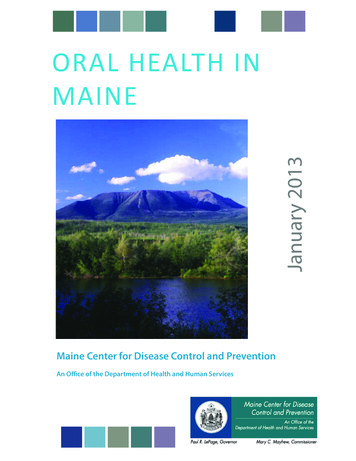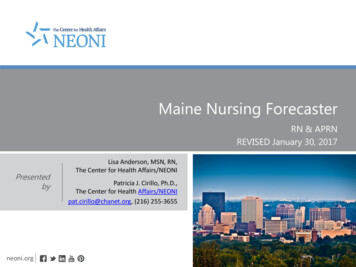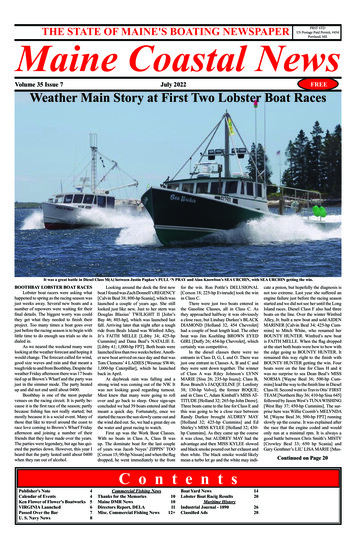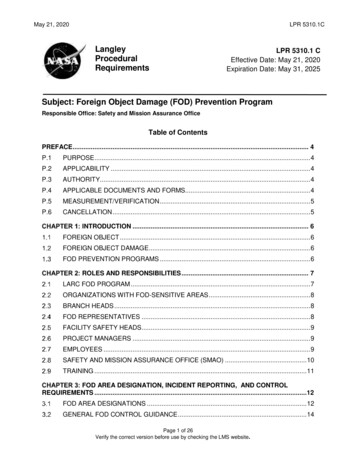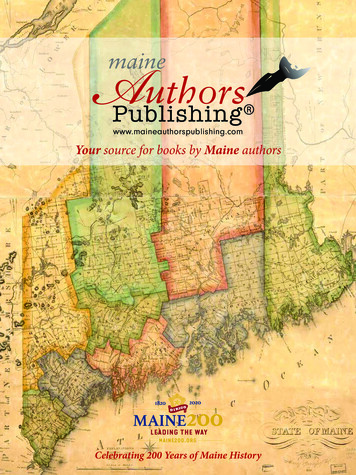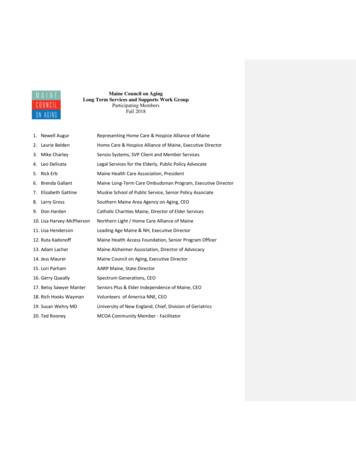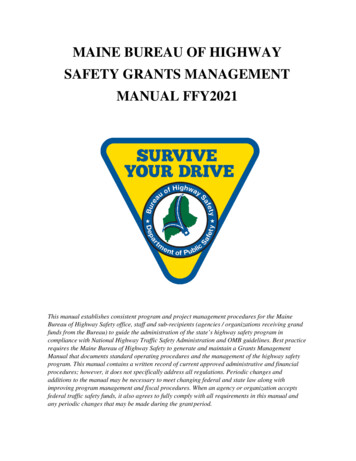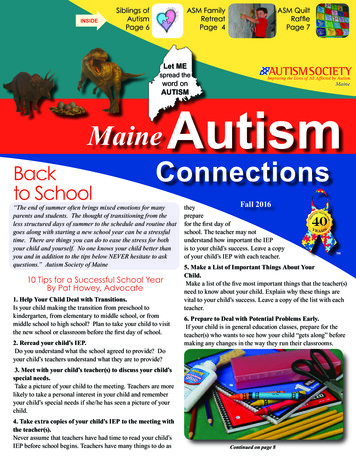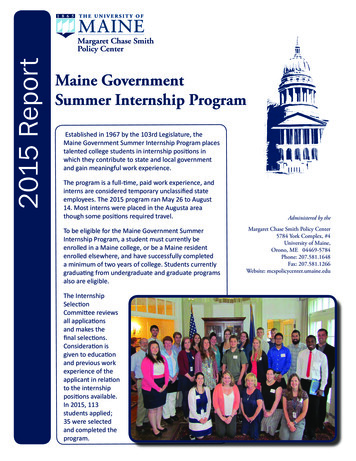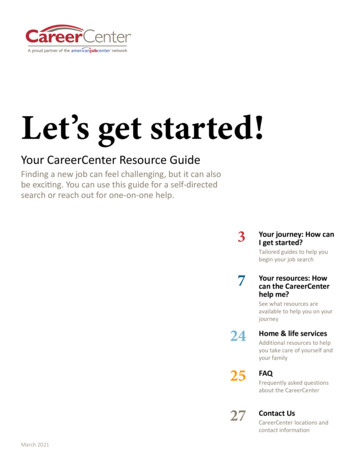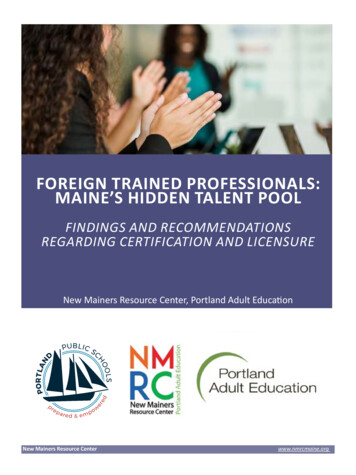
Transcription
FOREIGN TRAINED PROFESSIONALS:MAINE’S HIDDEN TALENT POOLFINDINGS AND RECOMMENDATIONSREGARDING CERTIFICATION AND LICENSURENew Mainers Resource Center, Portland Adult EducationNew Mainers Resource Centerwww.nmrcmaine.org
New Mainers Resource Center, Portland Adult EducationAbout UsThe New Mainers Resource Center (NMRC) is a program within Portland Adult Education serving areaimmigrants and refugees. It includes: a skilled professional program employment case management advising regarding credential evaluation and licensing intensive classes focused on job readiness skills professional networking groups workshops and other offerings.These offerings are designed to help new Mainers, of all professions, overcome barriers to enteringthe US workforce. NMRC participants take advantage of the other classes and programs offered atPortland Adult Education. NMRC also serves as a member of the national Welcome Back Initiative.Additionally, NMRC works closely with area employers to help them meet their workforce needs.MissionTo support Maine’s economic development by meeting employers’ demands for a skilled andculturally diverse workforce.Vision To grow Maine’s economy by fully utilizing the skills of foreign trained professionals. To help employers hire and retain qualified workers for a skilled and diverse workforce To help Maine’s immigrant and refugees overcome barriers and resume their professionalcareersWith support from the Betterment FundReport prepared November 2018 by:Dani M. Scherer M.Ed.Consultant, NMRCSally Sutton MPA, MSWProgram Coordinator, NMRCNew Mainers Resource CenterMaine’s Welcome Back CenterPortland Adult Education14 Locust St.Portland, Maine 04101207 g
Foreign Trained Professionals: Maine’s Hidden Talent PoolFindings and Recommendations Regarding Certification and LicensureTABLE OF CONTENTSExecutive Summary2BackgroundProblem StatementGeneral Scope of Project4Process6Findings and RecommendationI. Lack of Understanding of How the Licensure Process WorksII. The Value of Foreign DegreesIII. Accessing TranscriptsIV. Costs of The Licensure ProcessV. English Proficiency RequirementsVI. Work Experience RequirementVII. Additional Educational Requirements –Limited Access to Financial Aid99111213151517Recommendations for Specific Professional Licensing BoardsVIII. The Maine State Board of Nursing – NursesIX. The Maine Department of Education – Teachers andother Educational ProfessionalsX. State of Maine Board of Accountancy – CPA –Certified Public AccountantXI. State Board of Licensure for Professional Engineers – EngineersXII. Maine Board of Bar Examiners – LawyersXIII. State of Maine Board of Licensure in Medicine – Physicians181818191920Links to NMRC Professional Licensing Guides21Resources21119
Foreign Trained Professionals: Maine’s Hidden Talent PoolFindings and Recommendations Regarding Certification and LicensureEXECUTIVE SUMMARYIssues to be AddressedLicensing and credential evaluation are some of the most challenging aspects of a foreign trainedprofessional’s entry into the US workforce. This is particularly true for those who have come toMaine as refugees or asylum seekers. The United Sates has a decentralized system of regulatingprofessions with no one entity responsible for professional certification of licensed professionals.Additionally, the number of factors that each individual pursuing a license must take intoconsideration also means that there is not an easy answer for how to simplify the licensing andcertification process in Maine.General Scope of this ProjectThere are steps that Maine can take to help facilitate the evaluation and re-licensure process. Thisproject sought to identify some of the challenges that exist and provided recommendations foraddressing them. We did this by undertaking the following steps: Undertake a review of occupational licensing policy nationally and locallyReview a number of key licensed professions of greatest interest to new Mainers and developlicensing guides for these professions. These professions included: engineers, lawyers,teachers, doctors, nurses and CPAsDraw from the experience NMRC has working with hundreds of foreign trained professionalsas they move forward with their careersProduce a report that will identify barriers and possible strategies.Findings and RecommendationsAs discussed above the system for professional licensing is very decentralized which means that thereare a lot of different stakeholders that are involved in Maine’s licensing process, including nationalorganizations that dictate how a process must work. Our findings and recommendations cut acrossthis decentralized system. Some recommendations may be very minor including how informationshould be displayed on a licensing board’s website and others may attempt to address systemicissues regarding access to documents or resources needed to cover the costs associated withlicensing. The Findings and Recommendations are organized according to the following issue areas,after which we have provided recommendations specific to the professional licensing boards weresearched. Lack of Understanding of How the Licensure Process WorksThe Value of Foreign DegreesAccessing Transcripts2
Costs of the Licensure ProcessEnglish Proficiency RequirementsWork Experience RequirementsAdditional Educational Requirements – Limited Access to Financial AidThe recommendations for specific licensing boards include: Maine State Board of Nursing – NursesMaine Department of Education – Teachers and other Educational ProfessionalsState of Maine Board of Accountancy – CPA – Certified Public AccountantState Board of Licensure for Professional Engineers – EngineersMaine Board of Bar Examiners – LawyersState of Maine Board of Licensure in Medicine – PhysiciansProfessional Licensing GuidesThe major problem with understanding professional licensing is access to information about theprocess for each particular profession and knowing whether or not it is possible to fulfill all of therequirements for licensure. As a way to help address that problem, the main focus of this project wasto develop professional licensing guides for those professions which seem most in demand byparticipants in NMRC’s programming. These include: nurses, teachers, CPAs, engineers, lawyers anddoctors. These guides are available on the NMRC’s website at: www.nmrcmaine.org. While webelieve these guides go a long way to make the information for each of these professions moreunderstandable, the process for each is still very complicated. It is our recommendation for peoplewho want information about a specific profession to reach out to the appropriate licensing board forclarification or to seek the assistance of an advisor who is familiar with the licensing process for thatprofession.ConclusionAccording to the Migration Policy Institute (MPI) there are 7.2 million college educated immigrants inthe US, with more than half of them with degrees obtained in another country. Maine’s immigrantpopulation, particularly those who are coming with college degrees and professional experience,provides a tremendous resource to the state that could help Maine address its workforce needs.Given this pool of experienced trained professionals it is well worth the attention and effortnecessary to try to address the different barriers and challenges they face with licensing and helpfacilitate the entry of these foreign trained professionals into Maines workforce at the fullest extentpossible.3
Foreign Trained Professionals: Maine’s Hidden Talent PoolFindings and Recommendations Regarding Certification and LicensureBACKGROUNDProblem StatementThe New Mainers Resource Center (NMRC)2017 NMRC Participants/Students by Mostwas established at Portland AdultFrequent Professional BackgroundsEducation (PAE) by the Maine Legislaturein 2013. The establishment of this initiative Business/Economic99allowed PAE to build on and expand itsHealthcare72workforce development programs.Computer/IT39Portland Adult Education served over 2,200Arch/Engineers36English as a Second Language (ESOL)Education32students coming from more than 80Legal19countries in the 2017/2018 school year.020406080100120Serving over 400 students in each of thelast 2 years, the New Mainers ResourceProfessional BackgroundsCenter focuses on skilled immigrants, anddeveloping targeted programming that meets the unique needs of those with an advanced degreeand experience in a professional field. Data from 2017 shows that NMRC program participants cutacross all sectors. For the past 3 years, a majority of NMRC participants come with college degreesand many of them with graduate degrees and above. Given the workforce shortages facing the state,Maine’s highly educated and experienced immigrants are a resource we cannot afford to ignore.Licensure and certification are a decentralized problem which means that at every level, whether asan employer, licensing board, policymaker or educational institution we must work to gain a betterunderstanding of the challenges foreign professionals face in trying to get recognition of their trainingand professional experience. We must all take whatever steps we can to remove those barriers andwork to help facilitate that process. If we are successful at supporting this hidden talent pool, we willall benefit from the contributions Maine’s foreign trained professionals are able to make to ourcommunities, economy and state.Credential evaluation is one of the most challenging aspects of a foreign trained professional’s entryinto the US workforce. Unfortunately, given the number of factors that must be taken intoconsideration, there is not an easy answer for how to simplify this process. From a systemsperspective, licensing is a very decentralized process with no central body that oversees professionallicensing or certification. From a foreign trained professional’s perspective, the number of factorsthat must be considered regarding licensing in the US include: profession, national and state licensingor certification requirements, country of origin, year of graduation, ability to obtain documents,training experience, educational or professional goals, immigration status and conditions in homecountry, financial resources or obligations, English proficiency, amongst others.4
With 5 years of experience workingwith hundreds of professionals from180200158all different sectors there are some136150specific challenges that NMRC has75100encountered helping new Mainers484545 51understand the credential evaluation25 2924 3050and licensing process and whether0pursuing licensure is an option forHigh SchoolSome College Undergraduate Graduate DegreeDiplomaDegreeand Abovethem. For example, when is itnecessary to have an evaluation done,201520162017who should do it, what documents arerequired and how will the costs be covered. Evaluation of a degree is also only one step in thelicensing process and navigating this process is challenging at best and for many insurmountable.Other aspects of the licensing process typically include: demonstration of English proficiency,extensive testing which typically requires both a high level of English as well as knowledge of theprofessional content area, US work experience such as an internship, US references and possiblysome college level courses to fill in any gaps in coursework.Educational Level Among NMRC Participants by YearGenerally, each licensed profession allows some alternative path to licensure so that it is notnecessary for a person to repeat their entire education. These alternatives usually includerequirements set by the state board of that profession and by some national association which istypically made up of professionals in that field and state professional licensing boards from across thecountry.Just locating information about the process to obtain a professional license in Maine is a majorchallenge that new Mainers face. Information about licensing requirements for foreign trainedprofessionals is typically not easily accessible on Maine’s licensing boards’ websites or included ininformation about the licensing application process. It is sometimes necessary to dig into agency rulesto find information, or search through state and national websites and various guides and manualsfor information about the different steps in licensure.Most of the licensed professions in Maine fall under the Department of Professional and FinancialRegulation’s, Office of Professional and Occupational Regulation. Within this department only ahandful of the professional licensing boards, such as those for physicians or engineers, have their owndedicated staff. The other dozens of boards share staff. Some boards, such as for lawyers andteachers are outside of this department. Consequently, it is a very decentralized system with mostboards needing to comply with policies and procedures set by a national counterpart.As will be discussed in the Findings section of this report, locating and understanding informationabout licensing is just one challenge foreign professionals face related to licensure and certification.Each step in the process presents its own barriers that may be insurmountable for some to overcome.These include being able to: Access their school transcripts and diplomas The costs of the process – translation and evaluation of degrees, application and test fees, testprep courses, etc.5
Missing courseworkImmigration status and eligibility for educational programs and financial aidEnglish proficiencyNeed for volunteer or work experience in the USNeed to support US family and/or family back in home country.General Scope of ProjectThis project was able to draw from several different sources to inform its Findings andRecommendations. These sources included: work that was done with support received from theBetterment Fund to undertake a review of professional licensing procedures, develop severallicensing guides and produce a report; NMRC’s years of experience working one on one with newMainer professionals; and NMRC’s participation in programming and policy development at thenational, state and local level to address barriers to licensing. The general scope of this project andreport is as follows:1. Undertake a review of occupational licensing policy nationally and locally with a goal ofunderstanding best practices to inform strategies in Maine and to replicate where possible.2. Review several key professions (5-7) of greatest interest to new Mainers with the goal ofmaking information about licensing procedures more accessible so that skilled professionallicense seekers are better informed of the steps they need to take to obtain a license.3. Through a better understanding of board functioning, determine the best approaches forworking collaboratively with licensing boards to address issues, and improve transparency inthe process and assist those seeking a license.4. Produce and disseminate a report that will inform policymakers, licensing bodies, and otherinterested stakeholders of identified barriers and possible strategies to bring about change toreduce those barriers.PROCESS1. Producing Report on Findings and RecommendationsThe intent of this project and its final report is to have more people better informed. In addition tothe specific work discussed below to develop the licensing guides and the direct experience thatNMRC has working with foreign professional pursuing licensing, this project has also researched bestpractices nationally and been able to draw from the experience that NMRC has working in the policyarena at the local, state and national level. NMRC has been a member of the Welcome Back Initiativesince 2015. This is a national initiative of 10 programs around the country designed to build a bridgebetween internationally trained health workers in the US and the need for a linguistically andculturally competent health services in underserved communities. (https://www.wbcenters.org/)Some of these programs, like Maine serve more than just health professionals. This allows NMRC to6
be up to date on best practices and policy initiatives nationally. Additionally, in 2016, NMRC led ateam that was invited to participate in a White House Conference on New Americans, National Skillsand Credential Institute. This provided a great opportunity to interact with others from around thecountry who were also recognized for implementing best practices. This final report will draw from allthis experience to offer some findings on challenges and barriers, offer some recommendations andidentify next steps and specific issues to be addressed.To determine which 5-7 licensed professions to include in this project NMRC selected those thatreflected the numbers of new Mainers in that profession seeking assistance from NMRC. Thelicensing paths for these professions are also the most complicated, difficult to navigate, costly andfor some people, will have barriers that they will not be able to overcome. The professions wereviewed include: Nurses Teachers Doctors CPAs Engineers Lawyers2. Preliminary ResearchIt was important to understand what licensing information was available to foreign trainedprofessionals in their respective fields. A preliminary search of the website of each regulating bodyshowed directions specific to those with international credentials. Maine-specific websites often linkto other regulating bodies such as evaluation and test administration companies. These websiteswere also searched for relevant directions and guidance, revealing any online directions that weredifficult to understand or lacked continuity. The documentation of this search showed what a foreigntrained professional would see without doing additional inquiries (calling or emailing the board orevaluation companies, etc.). Initial research also included a review of any guides already available toforeign-trained professional, so that we could incorporate existing work or address gaps in theavailable information.We found that there is general guidance for foreign-professionals through World Education Services(https://www.wes.org/), and there are state-specific guides for a few states available throughUpwardly Global onal-licensing-guides/) forthose states that have partnered with Upwardly Global to produce professional guides. Our reviewrevealed that general guidance for foreign-trained professionals in the U.S. is not specific enough atthe state level to be useful to licensure candidates in Maine.3. Verifying InformationThe next step was to speak with the licensing boards for each identified profession, evaluators andtest administrators to understand the details of each licensure process. In many cases, a Maine’sboard works closely with a national company that conducts the evaluations and/or administers thetesting. For example, while the Maine Board of Nursing sets the requirements for nursing licensure inMaine, many of these requirements are reviewed and managed by the Commission on Graduates ofForeign Nursing Schools (CGFNS). Looking for consistency and clarity between each Maine board’swebsite and the associated regulating organization was important in creating the guides.7
4. Forming Important Partnerships with Colleges and UniversitiesSince each licensing process includes an educational requirement, it was important to talk to the localand online educational institutions and programs where licensure candidates could fulfill potentialeducational deficiencies. Often licensure candidates do not need to complete full degrees orcertificates, but instead only need a few courses. Talking with the program chairs and admissionsdepartments revealed what taking courses would look like for non-matriculated students with foreigndegrees. Different program chairs and admissions departments revealed what specific course prerequisites individuals would need to take, and whether there was an English proficiency requirementfor the course and in some cases if they would even be allowed to take the course if they were notfully enrolled in the program.5. Creating the GuidesThe guides were designed to show licensure candidates in each of the chosen professions therequirements for being licensed or re-licensed in Maine in that profession. Most guides include a flowchart, showing candidates a recommended path based on their education, required documents,experiences and personal resources (time and money) to successfully complete the licensure path.Whenever a document, webpage, company or resource is mentioned, the guide will link or hyperlinkthe viewer to the relevant source to make the guide navigable and useful to online readers. All timingand financial specifications are included in the guides, as well as alternate careers, test preparationresources and information about where in Maine a candidate can pursue further education or takerequired coursework.6. Adding Alternative Career Pathways and Education OptionsWe conducted research to identify other non-licensed jobs in each professional field. Licensurecandidates could consider these positions as a stepping stone job or a valid career if the licensurepath includes too many barriers. Additionally, we realized that many licensure candidates will need toconsider additional coursework, so for most guides, we included information on the local and onlineuniversities and programs and included entrance requirements for these courses.7. Sharing with Boards and Regulating BodiesEach board and other regulating body we communicated with received a copy of the guide. Throughthis exchange we were able to verify the content of the guides, altering information to be moreconsistent with board standards, if necessary. This was also an opportunity to speak with boardsabout some of the steps that seem most significantly prohibitive to foreign-trained licensurecandidates, laying the foundation for the future work of modifying and clarifying licensurerequirements for foreign trained professionals.8. Using Experience with Foreign Professionals to Inform WorkSince its establishment in 2013 the New Mainers Resource Center has worked with hundreds offoreign trained professionals. Providing individual advice regarding licensing and credential8
evaluation has been a significant aspect of that work. NMRC has also been acknowledged statewideas having developed an expertise in this area. This experience has helped to inform the design of theguides and the information that new Mainers, as well as other service providers, will need tounderstand and navigate these very challenging licensing procedures. The real life experiences of ourstudents and our efforts to provide them services has also helped to inform the findings andrecommendations of this report.FINDINGS AND RECOMMENDATIONSI. LACK OF UNDERSTANDING OF HOW THE LICENSURE PROCESS WORKSIn creating each guide, we contacted the appropriate licensure board and staff to seek clarificationand confirmation on our information and sources. Many of the Maine licensure boards share staffwith other regulatory agencies or are occupied reviewing applications. When they were able, theyprovided us with helpful guidance and provided feedback on the guides. The following general andboard-specific recommendations, if enacted, would hopefully help provide information to anapplicant before they contact the board. Additionally, they may have questions that fall outside thepurview of the board. Then, if they still need to reach out to a board, they may be better informedand have questions more specific to their own situation. This will help candidates gain a betterunderstanding of all requirements before they begin, what in most cases, is a timely and costlyapplication process. While it is important that Maine’s professional licensing boards have anindividual, who is available to respond to inquiries from applicants, having information clearlyavailable on a website for applicants as well as workforce and other advisors will help generally inkeeping people better informed about how the licensing process works.One of the motivations for beginning this project is that outside of each licensing board, there islimited guidance specific to Maine foreign trained professionals, and limited information for guidingthose professionals as they determine how best to pursue their career paths. During the past severalyears the New Mainers Resource Center has begun to develop a level of expertise in this area, but thenumber of individuals needing guidance and the complexity each board’s procedures has made this avery daunting undertaking. Due to the limited amount of guidance and advising that is availablearound licensure and certification, most foreign trained professionals either receive some of theinformation they need to make an informed decision, receive incorrect information, are not aware ofthe specific requirements they must meet or their options for other career opportunities. Even whenlicensure is a valid option, they may still need assistance and support to successfully complete thedifferent steps in the process. Others are not even aware of their licensing option and re-enroll in adegree program thinking they must re-do their entire education.A. Recommendation - Each board’s website references foreign-credentialed candidates differently.Often, foreign-trained applicants are mentioned within a reference to those licensed in other states.Our general recommendation would be for each board’s website to make explicit reference to thosewith foreign credentials and educations in the FAQ section, and include relevant links to evaluation ortesting sites, if appropriate.9
B. Recommendation - Some boards determine the deadlines for when an application opens andcloses. For example, nursing, sets a 1-year limit on applications. Because foreign-trained professionalsoften need to spend a significant amount of time requesting and receiving official documents,improving their English, fulfilling missing courses and passing complex tests, we would recommendthat application deadlines be extended without penalty for foreign-trained applicants.C. Recommendation - We recommend that each board post or link to our guide somewhere on theirwebsite to cut down on direct inquires and incomplete applications from foreign-trained applicants.Additionally, the guides contain information outside of the purview of the board, such as informationabout testing resources, local educational programs and alternative career paths. This informationmay be helpful to applicants but not specifically related to the licensure application. The Board ofLicensure for Professional Engineers, for example, was able to link to the engineer guide and share itwith their whole community through their regularly published newsletter. Other boards could do thesame, sharing the guide with their larger community through newsletters, listservs, etc.D. Recommendation - Some of the steps in the licensure process for many professions could beconsidered preliminary or evaluative. For example, the Board of Bar Examiners will review a foreigneducation before allowing an individual to officially apply. These steps help an applicant determine ifthey will be able to pursue licensure or not. First, we recommend that these steps become morecommon with other boards, if possible, potentially saving applicants considerable time and money.We would also recommend that the fees associated with this evaluative step be deducted from theeventual licensure application if the candidate does decide to pursue licensure.E. Recommendation - While this project only provided us an opportunity to review six professionallicensing boards, these boards should review these recommendations for improvements on theirwebsites. Other professional licensing boards should also look at their websites and how informationis presented so that information for foreign trained professionals is clearly visible and explained ontheir websites. It should contain current, easily navigable and active links to direct information ofrelated national licensing bodies. As part of their application materials boards should have identifiedsomeone within that board to respond to inquiries regarding the process for those with foreigncredentials and make that information available on the website.F. Recommendation – Career advisors, adult education programs, workforce professionals and othersshould receive training about advising foreign trained professionals on their options regardinglicensure and certification and the various factors that need to be taken into consideration. Thistraining should focus not only on professional licensure but generally the topic of credentialevaluations and when and how they should be done and alternative career paths. The NMRCprofessional guides and other resources and this report can provide some of the informationnecessary for this training.10
II. THE VALUE OF FOREIGN DEGREESThere are many factors that will influence the success of a skilled immigrant’s entry into the USworkforce at a livable wage or above: English proficiency, recognition of credentials, some US trainingor education, US work experience, networking and employer contacts. The focus of this report on thechallenges around licensing and credentials is meant in no way to suggest that those other factors arenot critically important steps to an immigrant’s successful pursuit of their career. However, asprograms are developed around Maine, both those specifically for immigrants and those gearedtoward raising the educational and skill level of Mainers overall to fill Maine’s workforce gaps, theyneed to consider the resources immigrants bring to the state. How can Maine take advantage of theskills and training Maine’s newest residents bring with them? Given the limited access to financial aidthat many immigrants will have, this is especially imp
VIII. The Maine State Board of Nursing - Nurses 18. IX. The Maine Department of Education - Teachers and 18. other Educational Professionals . X. State of Maine Board of Accountancy - CPA - 19. Certified Public Accountant . XI. State Board of Licensure for Professional Engineers - Engineers 19
